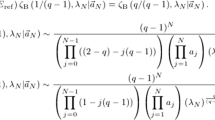Abstract
We study the time evolution of a quantum-mechanical harmonic oscillator in interaction with an infinite heat bath, which is supposed to be initially in the canonical equilibrium at some temperature. We show that the oscillator relaxes from an arbitrary initial state to its canonical state at the same temperature, and that in the weak coupling limit the relaxation is Markovian, that is exponential. In contrast to earlier treatments of the problem [4, 5], the results are obtained without assuming any particular special form for the self-interaction of the heat bath. No use is made of coarse graining, finite memory assumptions or randomly varying Hamiltonians.
Similar content being viewed by others
References
Araki, H.: Hamiltonian formalism and the canonical commutation relations in quantum field theory. J. Math. Phys.1, 492–504 (1960)
Araki, H., Woods, E.J.: Representations of the canonical commutation relations describing a non-relativistic infinite Bose gase. J. Math. Phys.4, 637–642 (1963)
Davidson, R., Kozak, J.J.: Relaxation to quantum-statistical equilibrium of the Wigner-Weisskopf atom in a one-dimensional radiation field. III. The quantum mechanical solution. J. Math. Phys.12, 903–917 (1971)
Davies, E.B.: Diffusion for weakly coupled quantum oscillators. Commun. math. Phys.27, 309–325 (1972)
Ford, G.W., Kac, M., Mazur, P.: Statistical mechanics of assemblies of coupled oscillators. J. Math. Phys.6, 504–515 (1965).
Friedrichs, K.O.: Perturbation of spectra in Hilbert space. Lectures in applied math. Vol. 3. Amer. Math. Soc. Publ. (1965).
Grecos, A.P., Prigogine, I.: Kinetic and ergodic properties of quantum systems — the Friedrichs model. Physica59, 77–96 (1972)
Hove, L. van: Quantum mechanical perturbations giving rise to a statistical transport equation. Physica21, 517–540 (1955)
Kac, M.: On the distribution of values of trigonometric sums with linearly independent frequencies. Amer. J. Math.65, 609–615 (1943)
Kato, T.: Perturbation theory for linear operators. Berlin-Heidelberg-New York: Springer Inc. 1966
Mazur, P., Montroll, E.: Poincare cycles, ergodicity and irreversibility in assemblies of coupled harmonic oscillators. J. Math. Phys.1, 70–84 (1960)
Papanicolaou, G.C.: A kinetic theory for power transfer in stochastic systems. J. Math. Phys.13, 1912–1918 (1972)
Reed, M., Simon, B.: Methods of modern mathematical physics, Vol. 1, Functional analysis. New York: Academic Press 1972
Segal, I.: Foundations of the theory of infinite dynamical systems II. Canadian J. Math.13, 1–18 (1961)
Stey, G.C., Gibberd, R.W.: Decay of states in some exactly soluble models. Physica60, 1–26 (1972)
Author information
Authors and Affiliations
Rights and permissions
About this article
Cite this article
Davies, E.B. The harmonic oscillator in a heat bath. Commun.Math. Phys. 33, 171–186 (1973). https://doi.org/10.1007/BF01667915
Received:
Issue Date:
DOI: https://doi.org/10.1007/BF01667915



